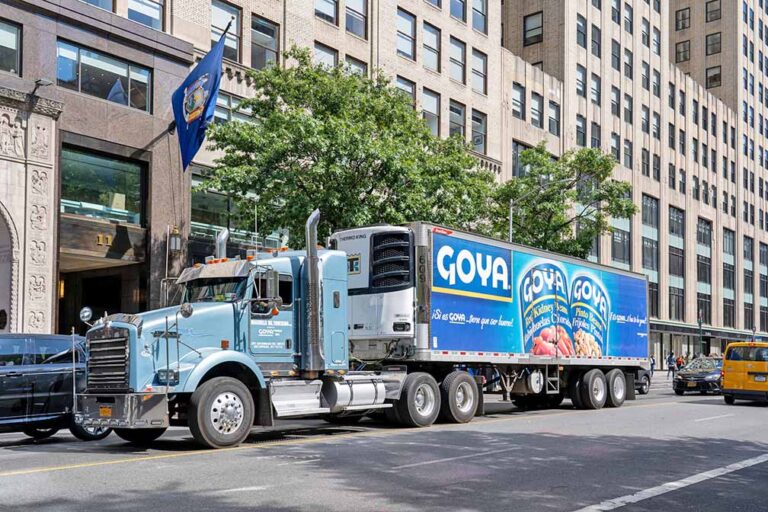NEW YORK — New York Gov. Kathy Hochul on Wednesday, June 5, indefinitely delayed implementation of a plan to charge motorists big tolls to enter the core of Manhattan, just weeks before the nation’s first “congestion pricing” system was set to launch.
The Trucking Association of New York (TANY) in May filed a lawsuit against the Metropolitan Transportation Authority (MTA) over the issue.
The lawsuit, filed in the Southern District of New York on May 30, argues that the congestion pricing policy unfairly targets trucking and logistics companies, which are charged far higher rates than passenger vehicles.
Under the finalized plan, trucks would be subject to a charge of $24 or $36 per trip into the congestion zone below 60th Street in Manhattan, depending on their size, compared to just $15 per day for passenger vehicles.
While the goal of the plan is ostensibly to reduce vehicle traffic during business hours, the MTA is also required to raise at least $1 billion per year with congestion pricing, per a legislative directive from Albany — meaning the agency is incentivized to maximize revenue by targeting those with inelastic schedules, like trucks.
“The MTA’s reckless congestion pricing policy ignores the warnings and counsel of industry experts on both sides of the Hudson, who warn that the discriminatory way trucks and logistics companies are targeted by the plan will increase costs for residents everywhere,” said TANY President Kendra Hems. “This lawsuit was a step we took only out of necessity after the MTA repeatedly refused to make any concessions to our industry and ultimately used our essential, hard-working members as a tool to meet their arbitrary funding requirements. We hope that we can, through this litigation process, create a more equitable and fair policy that works for New York City.”
Hochul’s move on Wednesday marks a stunning reversal for public transit advocates who had championed the tolls as a way of raising billions of dollars for New York’s beleaguered subway and commuter rail systems while reducing traffic in the city’s streets.
Hochul said that while she remains committed to the program’s environmental goals, implementing it now as New York City is still recovering from the COVID-19 pandemic “risked too many unintended consequences for New Yorkers at this time.”
The tolling program had been scheduled to start June 30.
New York would have become the first U.S. city to join a handful globally with similar congestion pricing schemes, including London, Stockholm, Milan and Singapore, which is credited with pioneering the first such program in 1975.
Most people driving passenger vehicles into Manhattan below 60th Street — roughly the area south of Central Park — would have to pay at least $15 under the system, with larger vehicles paying more. Those tolls would come on top of the already hefty tolls for using bridges and tunnels to enter Manhattan, like the $13.38 to $17.63 it costs to take a car through the Lincoln or Holland tunnels.
The MTA has already invested tens of millions of dollars installing cameras, sensors, license plate readers and other equipment on city roadways in anticipation of the plan’s launch. The fee was expected to provide an annual cash infusion of around $1 billion for subway and bus systems that carry some 4 million riders daily.
But as the scheduled start date drew closer, the fee had touched off growing backlash — and several lawsuits — from suburban drivers and some local officials who expressed concerns about the impact on commuters.
Members of the MTA board, which oversees the transit agency, said they had not been briefed on the delay.
“I’m in shock,” said Andrew Albert, a member of the board. “We won’t get new buses, new subway cars, new signals. It’s a betrayal of the millions and millions of people who would have been helped by this.”
Hochul had been a vocal supporter of the plan, which was signed into law by her predecessor, Gov. Andrew Cuomo, in 2019.
New York City Mayor Eric Adams said Wednesday that he would support the governor’s decision to reassess. “If she’s looking at what others we can do it and how we can do it correctly, I’m all for it,” he said. “This is a major shift for our city and it has to be done correctly.”
The Trucker Staff contributed to this report.
The Associated Press is an independent global news organization dedicated to factual reporting. Founded in 1846, AP today remains the most trusted source of fast, accurate, unbiased news in all formats and the essential provider of the technology and services vital to the news business. The Trucker Media Group is subscriber of The Associated Press has been granted the license to use this content on TheTrucker.com and The Trucker newspaper in accordance with its Content License Agreement with The Associated Press.














